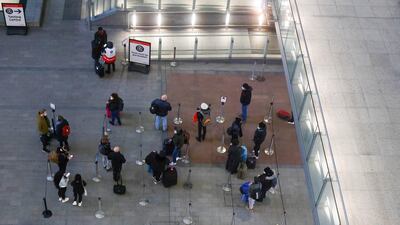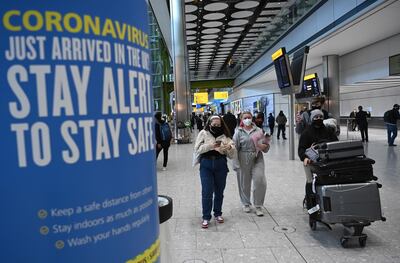Passengers arriving in the UK may have to self-isolate in hotels at their own expense in a move to prevent imported coronavirus cases.
People arriving at London's Heathrow airport on Monday experienced long delays after the country's quarantine-free travel corridors officially closed.
New rules require overseas travellers to self-isolate for 10 days, or show a negative test after five, regardless of where they came from.
International passengers also have to show proof of a negative Covid-19 test before setting off.
Travel industry leaders said the closure of travel corridors would deepen the crisis for the sector.
Why did the travel corridors close?
Prime Minister Boris Johnson closed the UK’s travel corridors to “protect against the risk of as yet unidentified new strains" of Covid-19.
Previously, travellers coming from a list of countries with low levels of the virus were allowed to enter the UK without the need for a 10-day quarantine.
Mr Johnson said new strains of the virus identified in South Africa and South America presented a risk to the country’s vaccination programme, so it was necessary to close the borders.
Passengers arriving at Heathrow on Monday morning faced lengthy queues after the corridors closed at 4am.
One passenger arriving from Nairobi said queues built up after officials enforced a triple check of passports, a negative Covid-19 test and the completion of a passenger locator form.
“There were a couple of people in our queue whose tests may have been outside the required 72 hours so that was causing a lot of grief and discussion,” he said.
The government said the travel corridors would remain closed until February 15 at the earliest.
What are the new rules for travellers?
Travellers arriving in the UK, whether by boat, train or plane, have to show proof of a negative Covid-19 test to be allowed entry.
The test must be taken in the 72 hours before travelling and anyone arriving without one faces a fine of up to £500. All passengers will still be required to quarantine for up to 10 days.
The isolation period can be cut short with a negative test with a private provider after five days, allowing those travellers to leave quarantine by day seven, as tests can take up to 48 hours to process.
What is hotel quarantine and how would it work?
Foreign Secretary Dominic Raab said on Sunday the government was considering introducing a hotel quarantine system similar to an approach used in Australia.
The move would significantly strengthen the UK’s border controls, as scientists advising the government said the system of “voluntary self-isolation” should be replaced as “a matter of urgency”.
They said “a managed isolation system” would ensure “the full period of isolation is completed”.
Civil servants were ordered to study Australia and New Zealand’s system of managed isolation. Singapore operates a similar scheme.
Under those programmes, citizens returning from abroad are forced to stay in quarantine hotels for 14 days at their own expense.
Passengers are transferred from the airport to the hotels, where they are largely confined to their rooms.
The hotels are monitored by the army, police and security firms to ensure no one leaves until permitted.
The system, which has been in place in Australia and New Zealand since March last year, was credited with preventing imported Covid-19 cases.
However, along with the effects of daily passenger caps, many airlines have chosen not to fly to Australia and New Zealand as the routes are not profitable. As a result, thousands of Australian and New Zealand citizens are stranded overseas, unable to return home because they are unable to secure a flight.
How would GPS tracking work?
Officials are also examining a scheme in Poland where those isolating are subject to “enhanced monitoring” and are contacted once a day.
Those in self-isolation are told to send a picture of themselves at the location in which they are quarantining.
The pictures are cross-referenced using facial-recognition technology and GPS data.
Under Poland’s system, those who fail to send a photograph within 20 minutes are visited by police.
Why didn’t the UK introduce tougher border controls earlier?
The government said keeping borders open helped businesses maintain international connections, boosted the economy and meant people could still travel for essential reasons.
It argued that by mid-March there was "significant transmission" in the UK and any extra travel restrictions at that time would have had a "very marginal" effect.
Transport Secretary Grant Shapps said last week that shutting the borders would have been impractical for the UK, which relies on imports for food and medical supplies.
He cited the US as an example of a country that had closed its borders to non-citizens but had exponential rates of coronavirus.
However, a parliamentary inquiry criticised the government for the delay in imposing tighter restrictions.
"The government's failure to have proper quarantine measures in place in March as the infection was spreading fast was a grave error and meant Covid spread faster and reached more people," Labour MP Yvette Cooper, chairwoman of the inquiry said.
What has the tourism industry said?
Tourism industry leaders warned that the latest changes at the border amounted to a near-complete shutdown of the UK's airports.
Airport Operators Association chief executive Karen Dee said: "The UK and devolved governments now need to set out as a matter of extreme urgency how they will support airports through this deepening crisis.
"There is only so long they can run on fumes before having to close temporarily to preserve their business for the future. Government needs to help cover airports' operational costs by, for example, urgently providing relief from regulatory, policing, air traffic and business rates costs in the current and the coming tax year."
Airlines UK chief executive Tim Alderslade said: “Travel corridors were a lifeline for the industry last summer and the government were right to bring them in when they did. But things change and there’s no doubting this is a serious health emergency and ministers need to act to keep borders safe and the public protected.”
”We therefore support this latest measure, on the assumption that we will work with the government – when the time is right – to remove these restrictions when it is safe to do so and start to open up our sector again, to support the UK’s economic recovery.”











